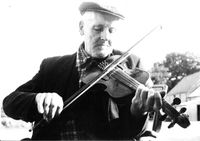Annotation:Japanese Hornpipe: Difference between revisions
*>Move page script |
m Text replace - "[[{{BASEPAGENAME}}|Tune properties and standard notation]]" to "'''Back to [[{{BASEPAGENAME}}]]'''" |
||
| Line 1: | Line 1: | ||
[[{{BASEPAGENAME}} | '''Back to [[{{BASEPAGENAME}}]]''' | ||
---- | ---- | ||
<p><font face="garamond, serif" size="4"> | <p><font face="garamond, serif" size="4"> | ||
| Line 29: | Line 29: | ||
<br> | <br> | ||
---- | ---- | ||
[[{{BASEPAGENAME}} | '''Back to [[{{BASEPAGENAME}}]]''' | ||
Revision as of 16:11, 4 April 2012
Back to Japanese Hornpipe
JAPANESE (HORNPIPE), THE. Irish, Hornpipe. Ireland, County Donegal. A Donegal hornpipe made popular by fiddler John Doherty [1]. The tune originally came from a travelling circus which frequented Donegal. As one of the circus acts a troupe of performers, together with a fiddler, would act a comic skit to the first part of the tune, but when the second part came around they would stop the action and perform a comic dance. This structure was repeated until the conclusion of the skit. The tune was remembered by local Donegal musicians in attendance, and comes down to the present generation of Donegal fiddlers via Doherty. A shift to third position on the fiddle is required when playing the tune.

Source for notated version:
Printed sources: Bulmer & Sharpley (Music from Ireland), vol. 4; No. 65.
Recorded sources: Bowhand 001CD, Danny Meehan - "The Navvy on the Shore" (2000. Learned from his grandmother, who played it with the influential Donegal musician John James Cannaghan). Paddy Glackin - "Hidden Ground."
See also listing at:
Alan Ng's Irishtune.info [2]
Back to Japanese Hornpipe
